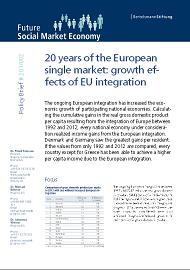Véron, Ν. (2014) “Europe’s Single Supervisory Mechanism: Most small banks are German (and Austrian and Italian) – a closer look at the ECB’s list shows that the smaller banks are concentrated in a limited number of countries, much more so than larger ones“, Bruegel Think Tank, 22 September. A well-known limitation of Europe’s banking union is the fact that most banks in the euro area will escape direct supervision …Read More
Addressing weak inflation: The European Central Bank’s shopping list
Claeys, G., Darvas, Z., Merler, S. & Guntram, B. (2014) “Addressing weak inflation: The European Central Bank’s shopping list“, Bruegel Institute, Policy Contributions, 06 May. There are clear benefits to price stability. High inflation can distort corporate investment decisions and the consumption behaviour of households. Changes to inflation redistribute real wealth and income between different segments of society, such as savers and borrowers, or young and old. Price stability …Read More
20 years of the European single market: growth effects of EU integration
Petersen, Τ. (2014) “20 years of the European single market: growth effects of EU integration“, Policy Brief 2014/02, Future Social Market Economy, Bertelsmann Stiftung, 29 July. The ongoing European integration has increased the economic growth of participating national economies. Calculating the cumulative gains in the real gross domestic product per capita resulting from the integration of Europe between 1992 and 2012, every national economy under consideration realized income gains …Read More
Making macroprudential regulation operational
Kashyap, K. A., Tsomocos, D. & Vardoulakis, A. (2014) “Making macroprudential regulation operational“, VoxEU Organisation, 18 July. Do the extant workhorse models used in policy analysis support macroprudential and macrofinancial policies? This column argues that this is not the case and describes a new macroprudential model that stresses the special role played by banks. The model also accounts for two, often neglected, key principles of the financial systems. Some …Read More
Europe between financial repression and regulatory capture
Pagliari, S., Vallée, S. & Monnet, E. (2014) “Europe between financial repression and regulatory capture“, Working Paper 2014/08, Bruegel Think Tank, 10 July. The financial crisis modified drastically and rapidly the European financial system’s political economy, with the emergence of two competing narratives. First, government agencies are frequently described as being at the mercy of the financial sector, routinely hijacking political, regulatory and supervisory processes, a trend often referred …Read More
EU firms’ access to external financing
O’Toole, C., Kay, N., Murphy, G. & Siedschlag, I. (2014) “EU firms’ access to external financing“, VoxEU Organisation, 29 June. Small and medium-size enterprises (SMEs) often report difficulties in obtaining external finance. Based on new research, this column argues that these difficulties are not due to greater financial risks associated with SMEs. Instead, they are the result of imperfections in the market for external finance that negatively affect smaller …Read More
No Industry, no Future?
Fontagné, L., Mohnen, P. and Wolff, G. (2014), ” No Industry, no Future?“, Bruegel, 19 June. In a context of weak growth, high unemployment, unbalanced public finances and persistent external deficit,we are witnessing the return of a proactive approach to industrial policy and, even in France the return of direct intervention in industry. Sector-focused public intervention is thus once again conceivable, while industry is once more perceived as a reservoir …Read More
What a Drag: The Burden of Nonperforming Loans on Credit in the Euro Area
Kerry, W., Portier, J., Ruggerone, L. & Verkoren, C. (2014) “What a Drag: The Burden of Nonperforming Loans on Credit in the Euro Area“, iMFdirect, 23 June. High and rising levels of nonperforming loans in the euro area have burdened bank balance sheets and acted as a drag on bank profits. Banks, striving to maintain provisions to cover bad loans, have had fewer earnings to build-up their capital buffers. This …Read More
Undercutting the future? European research spending in times of fiscal consolidation
Veugelers, R. (2014) “Undercutting the future? European research spending in times of fiscal consolidation“, Bruegel Policy Contribution, Issue 2014/6, June. Are R&D budgets being smartly used to address growth? How is the crisis affecting public Research & Development budgets across the EU? The crisis seems to have widened the gap between EU countries in public R&I expenditure. Even though the EU budget serves as mechanism to somewhat ease the …Read More
ECB: An appropriate monetary policy
Levy, M. (2014) “ECB: An appropriate monetary policy“, VoxEU Organisation, 16 May. As banks repay their loans from the Long-Term Refinancing Operation, the ECB’s balance sheet is shrinking. This column argues that, given the slow recovery and sustained low inflation, the ECB should replace its bank lending programme with quantitative easing. Buying short-term government debt would be consistent with the ECB’s inflation target, would keep the ECB’s monetary policy …Read More





